Choosing between an AMD Ryzen 5 and an Intel Core i5 can be tricky. At COMPARE.EDU.VN, we break down the architecture, performance, power usage, and pricing to help you decide. Explore which processor best suits your computing needs, whether it’s for efficient multitasking, gaming, or professional content creation, with our balanced analysis. Let’s explore performance benchmarks, thermal design power, and application performance.
1. Overview of Processors
Understanding the core differences and intended uses of AMD Ryzen 5 and Intel Core i5 processors is essential for making an informed choice. These processors cater to a broad spectrum of users, from gamers to content creators, each offering unique benefits.
1.1. Series and Models of AMD Ryzen 5
The AMD Ryzen 5 series targets the mid-to-high-end market, delivering outstanding multi-threading capabilities and cost-effectiveness. Key models include:
- Ryzen 5 5600X: Featuring the Zen 3 architecture, this CPU has 6 cores and 12 threads, with a base clock of 3.7 GHz and a max boost of 4.6 GHz. It excels in both gaming and multitasking scenarios.
- Ryzen 5 5600G: An APU with integrated graphics, ideal for users on a budget who still desire light gaming capabilities. It also offers 6 cores and 12 threads.
- Ryzen 5 3600: Built on the Zen 2 architecture, this model provides 6 cores and 12 threads, with a base clock of 3.6 GHz and a max boost speed of 4.2 GHz. It is a cost-effective option suitable for most gaming and daily tasks.
AMD Ryzen 5 processors particularly appeal to those seeking high performance within budget constraints, especially for tasks benefiting from multi-threading such as video editing and 3D modeling.
1.2. Series and Models of Intel i5
The Intel Core i5 series focuses on providing a balanced performance and efficiency ratio within the mid-range processor segment. Key models include:
- Core i5-12600K: Based on the Alder Lake architecture, it features a hybrid design with 6 performance cores and 4 efficiency cores, totaling 10 cores. It supports overclocking and is suitable for high-performance gaming and creative tasks.
- Core i5-11600K: Built on the Rocket Lake architecture, this CPU has 6 cores and 12 threads, with a base clock speed of 3.9 GHz and a max Turbo speed of 4.9 GHz. It is well-suited for both gaming and multitasking.
- Core i5-10400: Using the Comet Lake architecture, it offers 6 cores and 12 threads, with a base clock speed of 2.9 GHz and a max Turbo speed of 4.3 GHz. It is a budget-friendly option providing adequate performance for everyday computing.
Intel Core i5 processors cater to gamers, office users, and home users, particularly those looking for balanced performance in gaming and daily usage scenarios.
2. Ryzen 5 vs i5: Performance Comparison
When comparing Ryzen 5 vs i5, the performance benchmarks offer crucial insights. Both excel in different areas, making the choice dependent on the primary use case.
2.1. Single-core Performance Comparison
Intel i5 series processors tend to outperform AMD Ryzen 5 in single-core performance due to Intel’s emphasis on high frequency and IPC (instructions per clock cycle) in their architectural design.
AMD and Intel Single Threaded Test Table (Data Source: TechPowerUp)
The i5 processors maintain a higher single-core frequency, benefiting from Intel’s advanced process technology, resulting in excellent performance in single-threaded tasks. Applications sensitive to single-core frequency, such as certain games, office software, and web browsing, benefit significantly from the powerful single-core performance of i5 processors. This is the reason why many Mini gaming PCs prefer Intel processors.
While Ryzen 5 processors are slightly inferior in single-core frequency, their IPC has significantly improved thanks to the advanced Zen microarchitecture, narrowing the gap with i5 processors. In everyday use, this difference might not be noticeable.
2.2. Multi-core Performance Comparison
AMD Ryzen 5 processors generally outperform Intel i5 series in multi-core performance, mainly due to Ryzen’s higher number of physical cores. Ryzen 5 processors typically feature 6 physical cores, while i5 often has 4 physical cores. More cores give Ryzen 5 an advantage in multi-threaded tasks and multitasking.
When running multiple applications simultaneously or using software that requires full utilization of multiple cores, such as video editing, 3D rendering, and video encoding, Ryzen 5 processors leverage their multi-core performance effectively, significantly improving work efficiency. Ryzen 5 also has more threads than i5, further enhancing its multitasking capabilities.
Overall, Ryzen 5 is a superior choice for multi-threaded tasks and multitasking, while i5 is suitable if single-threaded performance is a key factor.
2.3. Gaming Performance
In terms of gaming, i5 processors, with their higher single-core frequency and IPC advantage, typically achieve higher frame rates. A comparison of average frame rates at 1080p resolution is shown below (Data source: TechSpot):
| Game | Ryzen 5 3600 | i5-10600K |
|---|---|---|
| GTA V | 115 | 126 |
| Red Dead Redemption 2 | 93 | 101 |
| Hitman 2 | 120 | 129 |
| Shadow of the Tomb Raider | 120 | 129 |
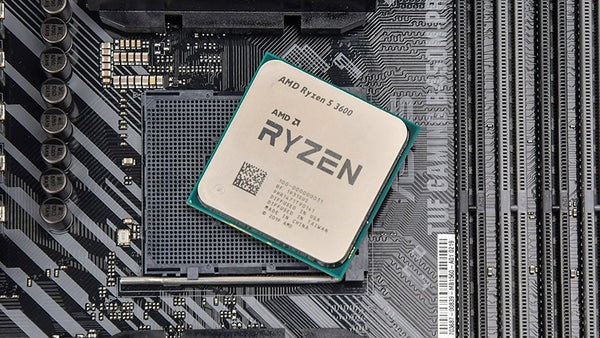
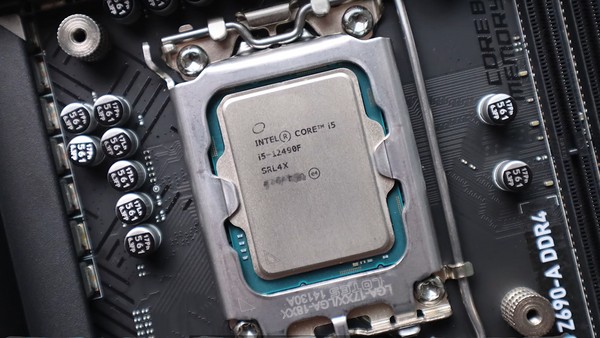
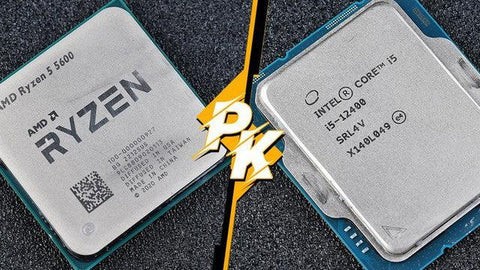

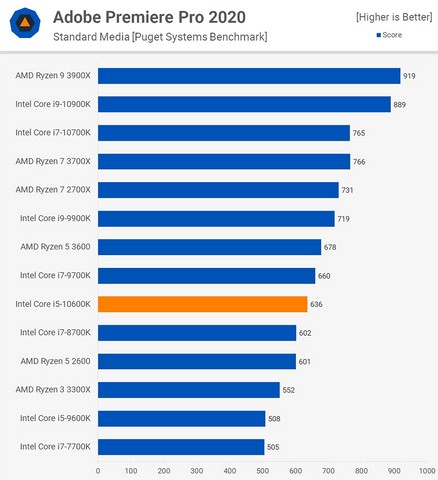
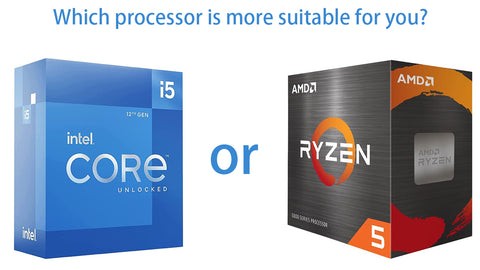
The i5-10600K generally leads the Ryzen 5 3600 by approximately 8-10% in these games. However, as the resolution increases, the impact of the CPU on the frame rate decreases, narrowing the gap between the two.
2.4. Video Editing
Image Source: Techspot
For multi-core intensive tasks like video editing, Ryzen 5 processors generally achieve faster completion times due to their higher number of cores and threads. A comparison of rendering times for a 1080p video in Adobe Premiere Pro 2020 is provided below (Data source: Puget Systems):
| Processor | Score |
|---|---|
| Ryzen 5 3600 | 678 |
| i5-10600K | 636 |
The Ryzen 5 3600 is approximately 42 points faster than the i5-10600K, leading in rendering performance by about 7%. With the same number of cores, Ryzen 5 leverages higher IPC and cache bandwidth to its advantage.
2.5. Multitasking
In everyday multitasking scenarios, such as running multiple apps and browser tabs, the performance of both processors is closely matched. Here’s a comparison of scores from the PCMark 10 – Applications test (Data source: TechSpot):
| Processor | Score |
|---|---|
| Ryzen 5 3600 | 9522 |
| i5-10600K | 9590 |
The i5-10600K is only about 1% higher than the Ryzen 5 3600, making it hard to distinguish between the two in multi-tasking contexts.
The i5 series has an edge in gaming performance, while the Ryzen 5 series excels in multi-core performance. Consumers can select the processor that aligns with their primary application scenarios. For gamers, the i5 is a better choice, while those handling video editing and 3D rendering may find Ryzen 5 more suitable.
3. Performance to Power Consumption Ratio
Understanding the performance to power consumption ratio is vital for choosing the right processor, influencing both energy efficiency and thermal management.
3.1. TDP (Thermal Design Power) Comparison
TDP indicates the maximum amount of heat generated by the processor under normal working conditions, measured in watts (W). TDP affects cooling design and the overall power consumption of the system.
- AMD Ryzen 5: Taking Ryzen 5 5600X as an example, its TDP is 65W. This processor’s power consumption is relatively low under normal load, making it suitable for high-performance systems, especially in small-sized cases or low-power environments.
- Intel i5: The TDP of the Intel Core i5-12600K is 125W. While offering excellent performance, its higher power consumption necessitates a stronger cooling solution, making it suitable for high-performance setups.
3.2. Efficiency and Cooling Performance
Processor efficiency and cooling performance directly impact system stability and user experience.
- AMD Ryzen 5: Due to its lower TDP, the Ryzen 5 5600X typically shows a better efficiency ratio under load, with lower cooling needs. Many users can use smaller coolers to maintain system stability and reduce noise.
- Intel i5: The Intel i5-12600K generates more heat under high load, requiring a stronger cooling solution. Although performance is robust, higher loads lead to increased temperatures and noise.
3.3. Impact on Different Users
The requirements and use cases of different users influence their focus on the performance-to-power consumption ratio.
3.3.1. Gamers
Gamers typically prioritize high frame rates and fluid gaming experiences. While Intel i5 processors perform excellently in gaming, their higher power consumption might require a stronger cooling system. Those seeking top performance might accept higher power consumption for a better gaming experience.
3.3.2. Content Creators
Content creators (such as video editors and 3D modelers) often handle multi-threaded tasks. AMD Ryzen 5 series processors are an ideal choice due to their performance in multi-threading tasks and power consumption advantages. Lower TDP and good cooling performance help the system stay more stable during prolonged periods of high-load work.
4. Ryzen 5 or i5 for Your Daily Use
Selecting between AMD’s Ryzen 5 and Intel’s Core i5 processors for daily use involves considering specific needs, budget constraints, and regular tasks. Both are mid-range options providing a balance of performance and affordability, with distinct advantages suiting different user profiles.
4.1. Ryzen 5 vs I5 for Users on a Tight Budget
If you are budget-conscious, AMD’s Ryzen 5 generally offers better performance per dollar. Its higher core and thread counts improve multitasking and provide some future-proofing. The potential savings on motherboards and the flexibility of upgrades make it an appealing option.
4.2. Ryzen 5 vs I5 for Gaming Enthusiasts
4.2.1. Intel Core i5: High Frame Rates and Stability
- Strong Single-Core Performance: Intel’s architecture often provides superior single-threaded performance, translating to higher frame rates in games that heavily rely on single-core speed.
- Stable Gaming Experience: Consistent performance in gaming applications, with optimizations in many games favoring Intel CPUs.
- Hyper-Threading Technology: Recent i5 models include Hyper-Threading, enhancing performance in multi-threaded gaming and streaming scenarios.
4.2.2. AMD Ryzen 5: Multithreaded Gaming and Streaming
- More Cores and Threads: Ryzen 5 CPUs typically offer more cores and threads, benefiting games optimized for multithreading and allowing for smoother multitasking during streaming or running background applications.
- Future-Proofing: As games become better optimized for multiple cores, Ryzen 5 processors may offer better longevity.
- Smart Access Memory: When paired with an AMD Radeon RX 6000 series GPU, Ryzen processors can leverage Smart Access Memory for a slight boost in gaming performance.
Recommendation for Gamers:
If your primary focus is gaming with the highest frame rates, especially in titles optimized for single-core performance, an Intel Core i5 might edge out the competition. However, if you stream your gameplay or run other tasks simultaneously, the AMD Ryzen 5 could offer a smoother experience due to its higher core and thread count.
4.3. For Content Creators and Professionals
4.3.1. AMD Ryzen 5: Multitasking Powerhouse
- Superior Multithreading: More cores and threads significantly improve performance in multi-threaded applications like video editing, 3D rendering, and complex computational tasks.
- Efficient Workflows: Better at handling simultaneous workloads, making it ideal for professionals multitasking between various resource-intensive programs.
- Overclocking Potential: Unlocked multipliers on all Ryzen CPUs allow users to overclock for additional performance gains.
4.3.2. Intel Core i5: Reliable with Improvements
- Improved Core Counts: Newer generations of Core i5 processors have increased core counts, narrowing the gap in multi-threaded performance.
- Quick Sync Video: Intel’s Quick Sync technology accelerates video encoding and decoding, benefiting some video editing and streaming applications.
- Stable Performance: Offers consistent and reliable performance in professional applications, though may lag behind Ryzen in heavily multi-threaded tasks.
Recommendation for Professionals:
For content creation and professional workloads benefiting from multiple cores and threads, the AMD Ryzen 5 is generally the better option. It provides excellent performance in multi-threaded applications, leading to faster render times and more efficient workflows.
5. Conclusion
Ryzen 5 and Intel i5 processors share similarities in positioning and performance, such as a similar price range, excellent gaming performance, and good multi-core performance. However, they also have different focuses. Ryzen 5 is better in multi-core performance, while i5 has a slight advantage in single-core and gaming performance. Users should weigh the pros and cons according to their budget, usage needs, and focus, choosing the model that best suits them.
Confused about which processor is right for you? Visit COMPARE.EDU.VN to explore detailed comparisons and make an informed decision.
6. FAQ
6.1. Which is better, the i5 or the Ryzen 5?
The i5 has a slight advantage in single-core speed, making it better for games and applications benefiting from high single-core performance. Ryzen 5 offers more cores/threads and potent multi-core performance, excelling in multi-threaded workloads like content creation and media streaming.
6.2. Is an Intel i5 good for gaming?
Yes, an Intel i5 processor is a great choice for gaming. Its strong single-core performance allows it to achieve high frame rates in most games, providing a smooth gaming experience, especially when paired with a capable graphics card.
6.3. Is Intel i5 or AMD Ryzen 5 better for everyday use?
For everyday tasks such as web browsing, office applications, and media consumption, both Intel i5 and AMD Ryzen 5 processors perform excellently. AMD Ryzen 5 provides more cores and threads, enhancing multitasking and performance in multi-threaded applications. Intel i5 offers strong single-core performance, beneficial for applications not extensively utilizing multi-cores.
6.4. AMD Ryzen 5 vs i5: Which is better for students?
For students frequently running multiple applications simultaneously and mindful of budget, AMD Ryzen 5 provides excellent multitasking capabilities and value. If integrated graphics and potentially better battery life are priorities, especially in a laptop setting, an Intel i5 might be the better choice.
6.5. What are the main differences between Ryzen 5 and i5 in terms of architecture?
Ryzen 5 uses AMD’s Zen architecture known for its multi-core performance, while Intel i5 uses its own architecture often emphasizing single-core speed.
6.6. Which processor is better for video editing, Ryzen 5 or i5?
Ryzen 5 is generally better for video editing due to its higher multi-core performance, which significantly reduces rendering times.
6.7. Can I overclock both Ryzen 5 and i5 processors?
Yes, certain models of both Ryzen 5 (indicated by ‘X’ in the model name) and i5 (indicated by ‘K’ in the model name) processors are unlocked for overclocking, allowing for additional performance tuning.
6.8. Which motherboard should I choose for Ryzen 5 vs i5?
For Ryzen 5, you’ll need a motherboard with an AMD chipset (e.g., B450, B550, X570), while for Intel i5, you’ll need a motherboard with an Intel chipset (e.g., B460, B560, Z490).
6.9. How does the integrated graphics performance compare between Ryzen 5 and i5?
Some Ryzen 5 models come with integrated Vega graphics, which offer decent performance for light gaming. Intel i5 integrated graphics vary by generation but are generally suitable for basic display tasks.
6.10. What is the typical lifespan of a Ryzen 5 or i5 processor?
The lifespan of both Ryzen 5 and i5 processors typically ranges from 5 to 10 years, depending on usage and maintenance.
Ready to make the right choice? Visit COMPARE.EDU.VN for more in-depth comparisons and reviews to help you choose the perfect processor for your needs. Our detailed analysis ensures you get the best performance and value.
Contact us at:
Address: 333 Comparison Plaza, Choice City, CA 90210, United States.
Whatsapp: +1 (626) 555-9090.
Website: compare.edu.vn
7. References and Further Reading
[1] AMD Ryzen 5 3600 vs. Intel Core i5-9600K: 2023 Revisit [Cited 2024 September 19] Available at: Link
[2] About TDP (Thermal Design Power) – GIGABYTE Global [Cited 2024 September 19] Available at: Link
[3] Intel® Core™ i5 Processor – Features, Benefits and FAQs [Cited 2024 September 19] Available at: Link
[4] AMD Ryzen 5 3600 vs Intel Core i5-13600K [Cited 2024 September 19]: Link
[5] Intel Core i5-10600K vs. AMD Ryzen 5 3600 vs. Ryzen 7 3700X [Cited 2024 September 19]: Link
[6] Intel Core i5-12600K Review – Winning Price/Performance [Cited 2024 September 19]: Link